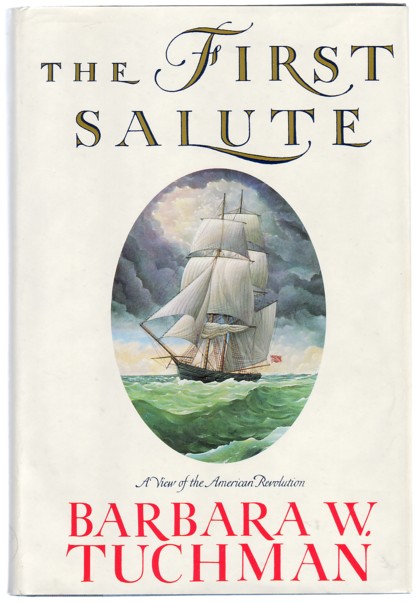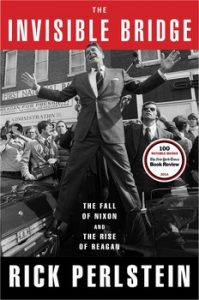The First Salute: A View of the American Revolution
by Barbara Tuchman
Review by Dan Geddes
Summary: Barbara Tuchman’s compelling view on the American Revolution highlights the key role played by The Netherlands in the struggle, first as arms merchant via Saint Eustatius (Dutch Antilles) and later as creditor and ally.
Barbara Tuchman was one of the greatest story-tellers among 20th century historians. She focused on key individuals, and presented history as dramatic struggle between all-too-human forces (often blundering into war, as in The Guns of August). The First Salute: A View of the American Revolution (1988) shows how the short-sightedness and even the vanity of leaders on both sides escalated the American struggle for independence from Britain into a general European war.
Tuchman highlights the key role played by The Netherlands in the American Revolution, especially in the early years of the rebellion. When war broke out against Britain in 1775, the American colonists were without allies. (France would not officially ally itself with the colonists until 1778). From where could the colonists buy guns and gunpowder? Their principal source of weapons was the tiny Caribbean island of Saint Eustatius, one of the Dutch Antilles.
Saint Eustatius had become a world-important entrepôt after establishing itself as a free port and abolishing customs duties in 1756. Trade embargoes between the powers were easily circumvented by trading at Saint Eustatius, which became known as “The Golden Rock,” or affectionately as “Statia”. Thus, no country wanted to attack it, despite its relative defenselessness. When the American rebellion began, Dutch merchants shipped arms to Saint Eustatius for delivery to the Americans. The British were convinced that this flow of arms was the only thing keeping the nascent American army in the field.
“The First Salute” refers to the events of 16 November 1776, when the governor of Saint Eustatius, Johannes de Graaff, returned the salute of the visiting American ship Andrew Doria—the first time a great power acknowledged an American vessel at sea, thereby tacitly recognizing American independence. The British were enraged at this perceived betrayal by the Dutch, and the further deterioration of relations eventually led to the Fourth Anglo-Dutch War (1780-1784), which fully exposed the appalling weakness of the Dutch Republic.
Tuchman also devotes a chapter to the Dutch Golden Age (“Beggars of the Sea — The Dutch Ascendancy”), showing how the Dutch Republic was an important influence on the American colonists. The Dutch had already
… passed the peak of dynamic accomplishment in almost every realm of endeavor—in hydraulic engineering to make their own land habitable, in the longest successful revolt for political independence sustained against the greatest imperial power of the age, in flourishing commerce, business and banking, in maritime enterprise covering the oceans, in the supreme art of the Golden Age of Rembrandt, in everything but government, where they contented themselves with a paralytic system that would not be tolerated by a primitive island of the Pacific. For all these qualities—positive and negative—the Dutch were the most interesting people in Europe …” (23).
Many Dutch people saw similarities between the American Revolution and their own struggle against the Spanish, and so were sympathetic to the American colonists. The American Founding Fathers looked to the Dutch example as an inspiration (though they tried to draw up a more workable political framework).
The Americans also did their best to further draw the Dutch into the war against the British. After American captain John Paul Jones won a naval engagement against the British near the Yorkshire coast in 1779, he was instructed to shelter at Texel, rather than in a French port. Jones became a local hero: “ballads celebrating his presence in Amsterdam were sold in the streets” (84), while the British ambassador protested loudly to the Dutch government. The Dutch were also supplying vital naval stores to the French, and trying to join the Neutrality League aimed at Britain’s high-handed maritime practices. Finally, the British decision to make war on the Dutch was taken “at a Cabinet meeting at which Lord North fell asleep when the problem was discussed and Lord Hillsborough and Sandwich dozed—the result, it was said, of making policy decisions after dinner.” (89)
Britain’s Admiral Rodney (who some have called the greatest seaman between Drake and Nelson) seized Saint Eustatius in February, 1781. By then its role as a transshipment point for arms had been obviated by the French alliance. Rodney inspected the account books and was horrified at the extent to which British merchants had also been selling arms to the American rebels. But he was overzealous in his prosecution of British subjects—some of whom had powerful friends in Parliament—and the counter-suits against Rodney ultimately tainted his victory. At the end of the war, the island was returned to the Dutch.
The second half of the book covers the founding of the US navy, America’s diplomacy to achieve the French and Dutch alliances, and the build-up to the decisive battle of Yorktown.
The First Salute makes no claim to be a comprehensive history of the American Revolution. Instead it offers striking portraits of the key players, showing the circumstances and the decisions they were confronted with. Tuchman had a remarkable flair for selecting the details that make history come to life. Rather than presenting history as the outcome of massive socio-economic forces, she presents history as a play of personalities, acting with imperfect information and sometimes questionable motives in a sea of uncertainty. Tuchman showed us there are no inevitabilities in history.
Amsterdam
18 September 2010











Be First to Comment